Research Laboratories
Three collectives of artists are doing research on behalf of FRATZ 2020. Here we give an insight into their work.
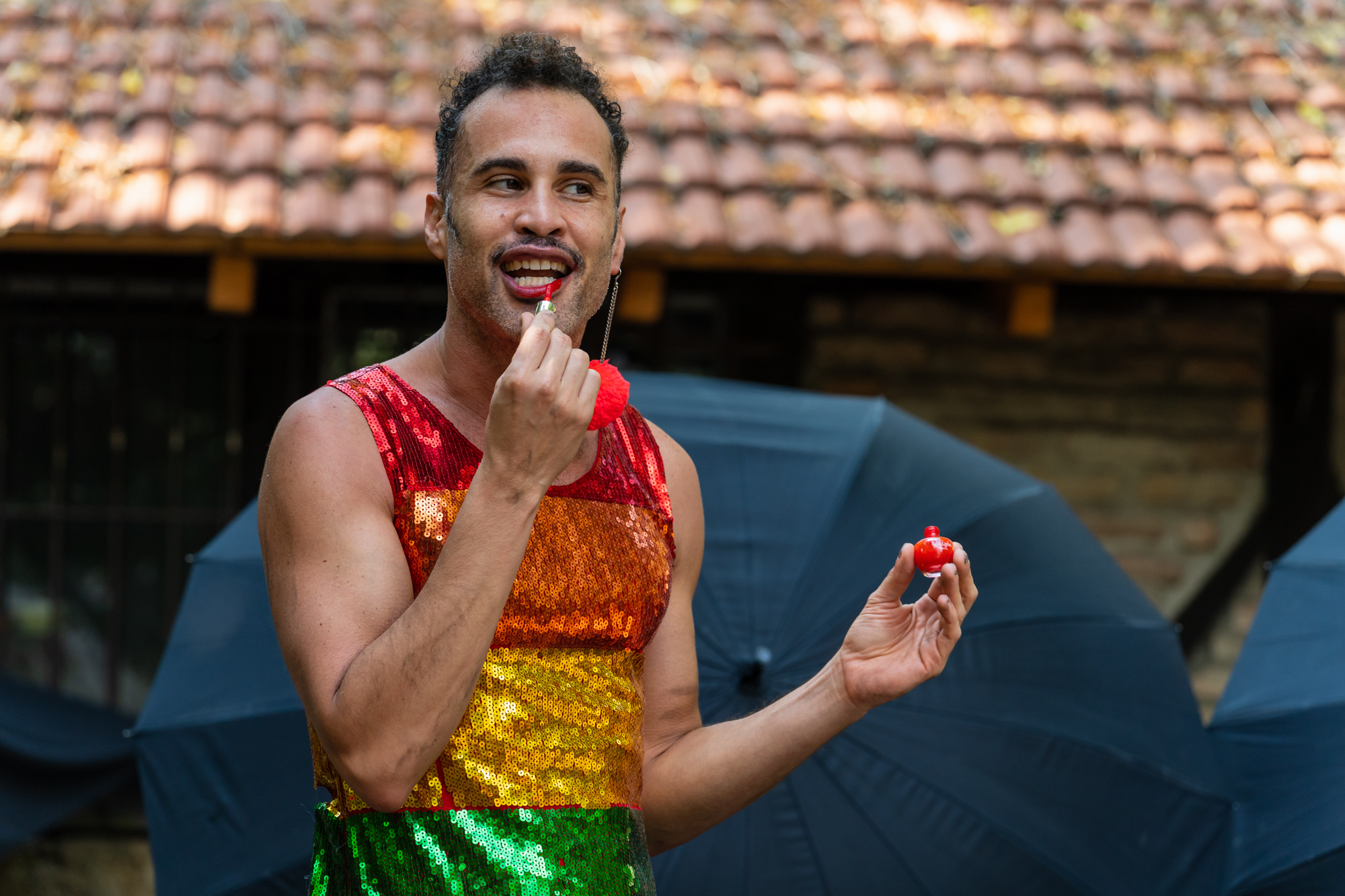
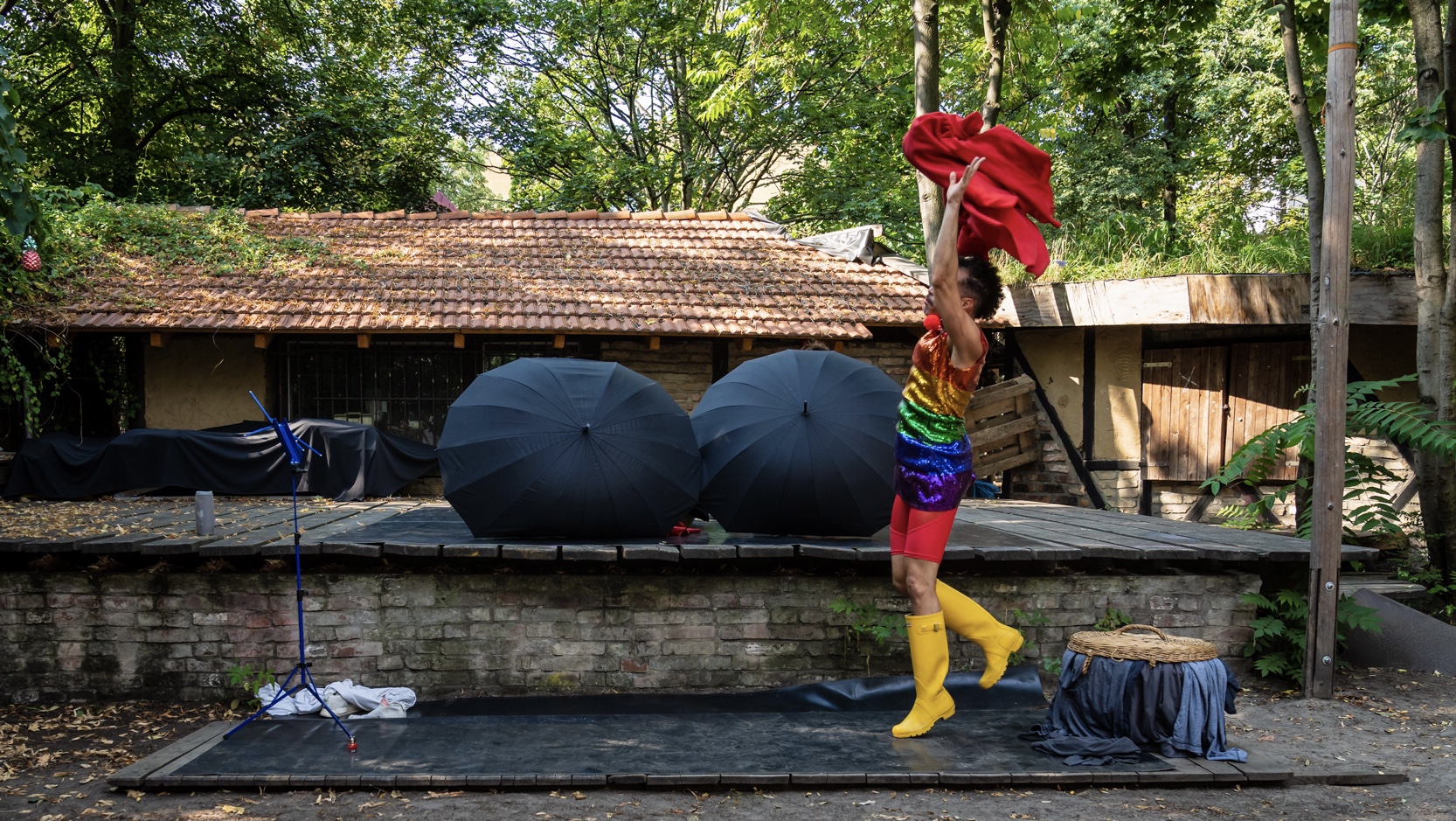
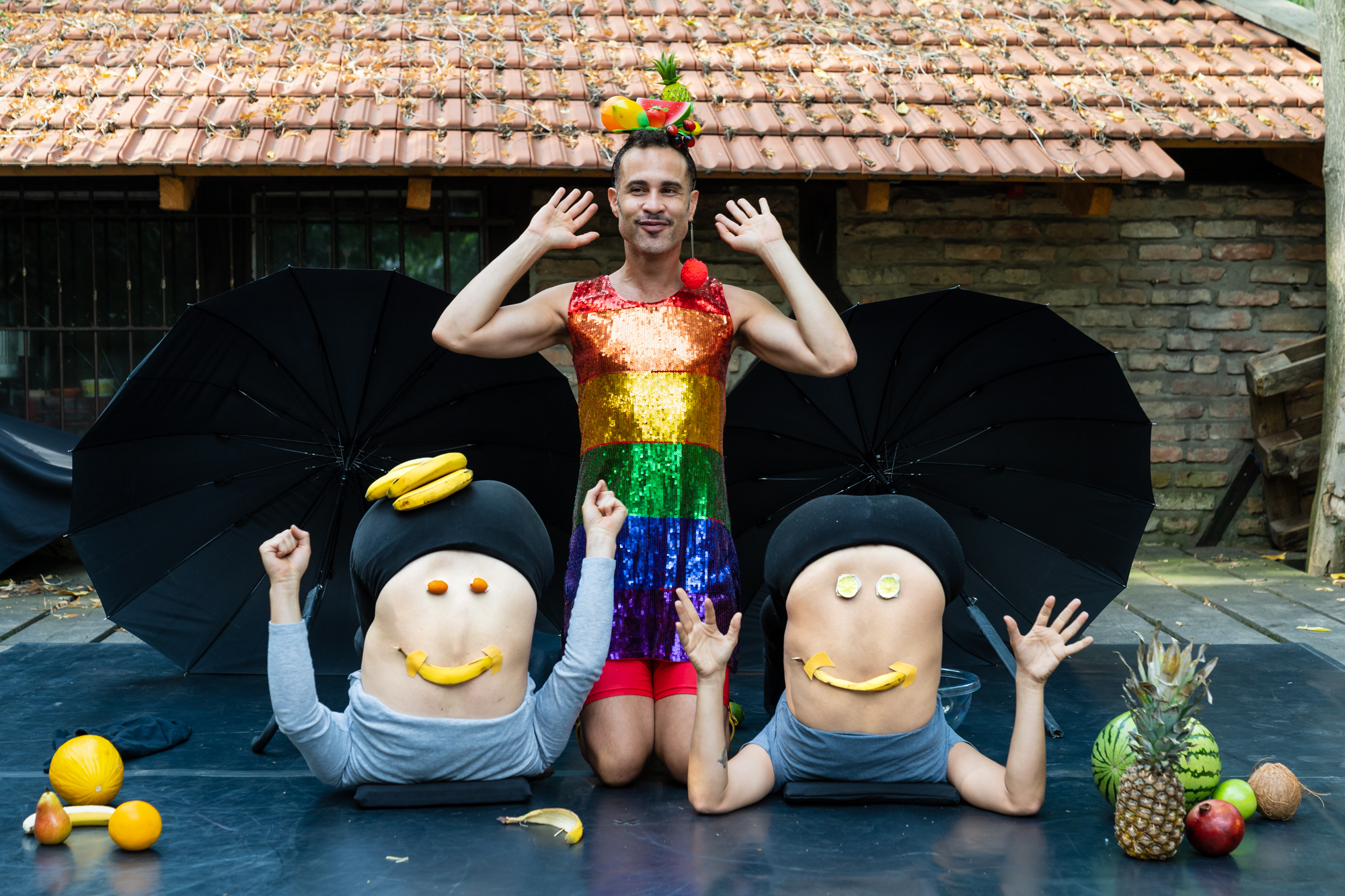
Laboratory:
The Superpowers of the so far not-celebrated Super-heroines
With Caroline Alves (BR), Iury Salustiano Trojaborg (BR/DK/DE), Mareike Jung (DE)
- Research question: How can we develop narratives that increase empathy and understanding of each other’s differences among children aged 2-6 years, by presenting them non-binary models of superheroines?
This research aims to present non-celebrated figures of our society in the form of super-heroines. A non-binary Indigenous warrior who fights for gender equality. A female cook who feeds not only the body but also the soul of discriminated minorities. Which superpowers would they have? Empathy? Understanding of differences? Capacity to listen? How do we illustrate such superpowers?
Using theatrical tools and the movement language of the [wo]men in back* company, the idea is to experiment with two different age groups of children (between 2 to 4 and 4 to 6 years of age) and to expose them to role models different from those they are used to view/understand as superheroes. We want to create a space in which figures such as non-binary super-heroines are engaged in sharing with the world the importance of such »superpowers« as empathy.
* Following the reflections brought by this laboratory, the company originally called »men in back« decided to make an intervention in its own name by adding the suffix »[wo]men in back«.
Dramaturgical advice: Marie Yan
Presentation & Talk
Where: Podewil and digital
Time: October 25, 2020, 11:00 to 13:00
In English language. Translation into German available.
Research Laboratory: The Superpowers of the so far not-celebrated Super-heroines (2020-10-25)
00:00:35 | Talk with Caroline Alvez, Mareike Jung and Iury S. Trojaborg of the research laboratory
Find a recording of an early version of the performance here on YouTube.



Laboratory:
TAH DAM! (together at home, dance and music)
In association with MusicDance Cape Town and ASSITEJ South Africa
Website of the project: https://www.tahdam.com/
Our project began by asking how we can collaborate with children to compose a music and dance performance together in real-time. Now, due to the Corona Pandemic, we are not able to gather for a few weeks and must stay at home with our families and find other ways to connect. Therefore we adapted our research design accordingly:
- New research question:
How can we create music and dance related activities for child and caregiver to do at home?
How can we include these activities in a performance for children age 2-5years?
Do these activities function as valuable 'priming' for children fo a more meaningful experience of the live performance?
This research project looks at ways of bringing music and dance into the daily lives of young children (age 2-5years). The goal is to provide parents and caregivers with activities/games to play with their children at home. The games are guided by basic principles of music and dance composition and are shared via short and easily accessible online videos. Material shared in these videos is also incorporated into a live music and dance performance. It will will form the score for our performance. We draw on our diverse creative backgrounds and knowledge of both Western and African music and dance traditions. We would like to find out if these games that children can play with their family at home can provide an experience that will make the live performance event more personal and meaningful to them.
Dance: Thalia Laric, Manuela Tessi, Sumalgy Nuro
Music: Vintani Nafassi (African percussion), Coila Enderstein (piano, electronics)
Dramaturgy: Nicola Elliott
Research: Faye Kabali-Kagwa
Video: Lindsey Appolis
Presentation & Talk
Where: digital
Time: November 7, 2020, 11:00 to 13:00
In English language. Translation into German available.
Research Laboratory: TAH DAM! (together at home, dance and music) (2020-11-07)
Click here for the project website of TAH DAM!.
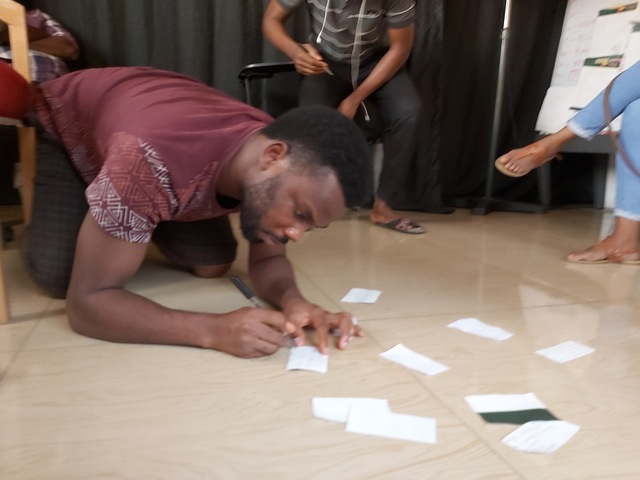
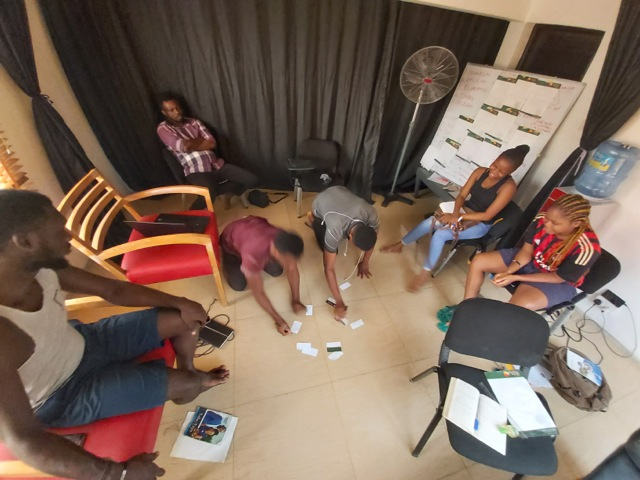
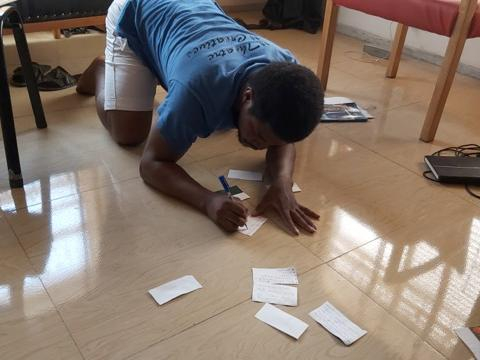
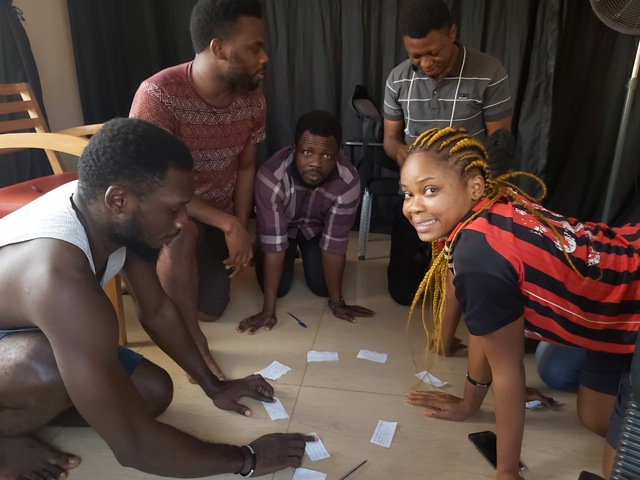
Laboratory:
»Skin-Tone«
by Joshua Alabi und KiNiNso Koncepts, Lagos, Nigeria
Trailer on Facebook: https://fb.watch/1w_0hJhURx/
- Research question: Colors, can it just be beautiful?
Did you know? In places like Uganda, Kenya, Nigeria and other parts of Africa both men and women wish to peel off their skin color or have it brightened within the blink of an eye, only if they had a chance. As a child, I remember the big aunties and uncles tried to change the color of their Skin. The African society in a bid to demean this act would tag some as »bleachers«, but instead, those involved would term themselves »toners«. Is the issue the differences of skin color or the ideologies of homogenization and hierarchisation colorism* carries? When topics of color and race are depicted in theater one wonders what runs through the mind of children. Does curiosity come before amazement or the other way round? How do the children see or react to the diversity of skin colors in the context of theater or arts and how can we celebrate it?
We intend to make the children see beyond the colors. Yes, colors are beautiful and they make the world glow and sparkling. But only eyes that see beauty can shun color bias and difference. Among children, we want to celebrate darker skin at the same time as we celebrate lighter skin. We will be working around »SKIN TONE« this idea being birthed from our questions and thoughts about skin color, segregation, bigotry, intolerance, narrowness, separatism using our reflections around Nigeria, Africa and Europe as inspiration. Theater being the place that brings everyone together from all cultures and background, we want to share these questions and topic with the children and find ourselves escaping into secrecy, sacredness, simplicity and openness of heart.
Joshua Alabi was invited to FRATZ International 2017 with his production »Sandscapes«, but his entry visa was denied by the German administration. Theater o.N. later issued a statement about this refusal and invited him a year later as observer of the 2019 edition of the festival. The relation continues this year with the SKIN TONE lab and the participation of KiNiNso-Koncepts, Joshua Alabi's ensemble and dance-theatre company.
With: Aniefiok Inyang, Oluchi Ukachukwu, Chinenye Chukwudi, Julius Obende, Joshua Alabi
Dramaturgical advice: Marie Yan
* Definition of colorism: prejudice or discrimination especially within a racial or ethnic group favoring people with lighter skin over those with darker skin (Merriam Websters Dictionary). Many credit Pulitzer Price Winner Alice Walker to have coined the term in 1982.
Presentation & Talk
Where: digital
Time: November 8, 2020, 11:00 to 14:00
In English language. Translation into German available.
We recommend watching the film "Skin" (2019) by Beverly Naya in advance. The film is available in Germany on Netflix and Amazon Prime.
Netflix: https://www.netflix.com/title/81270770
Amazon Prime: https://www.amazon.com/Skin-Beverly-Naya/dp/B081DC841T
Research Laboratory: Skin-Tone (2020-11-08)
Watch the documentary on KiNiNso Koncepts Productions' research here on YouTube.
